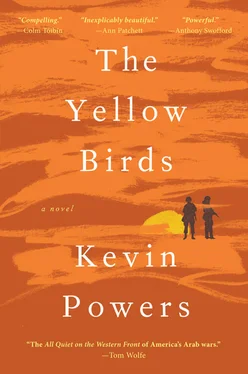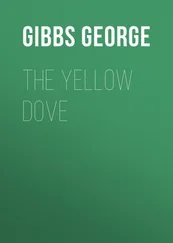He came over to me and put his hand on my shoulder. I could see he was fingering a pair of handcuffs underneath his overcoat. “You’re gonna be OK, John,” he said. “Trust me.”
“There are lies all through this.”
“It’s just the way it’s gotta be, kid. Someone has to answer for some of it.”
“Shit rolls downhill, huh, Captain?”
“Shit’s rolling everywhere nowadays. It’s a shitty goddamn war. You ready?”
I put my hands out, wrists up, and he clicked the cuffs in place in front of me. “You’ll be all right,” he said again.
“I just wish more of it was true,” I said.
“Me, too, but it’s lies like this that make the world go ’round.”
“You mind if I take something with me?”
“Go ahead, but they’ll take it from you when we get there.”
“That’s all right,” I said. I walked over and picked up Murph’s casualty feeder card and my own and tucked them into the elastic band of my PT shorts.
He led me down through the cool dampness of the stairwell and out into the street. His car was parked on the road across the footbridge and I asked if we could stop a minute when we got to the middle of the bridge. I threw the two cards into the river awkwardly and watched them until they had floated past the old railroad trestles downstream and disappeared far out of sight. It was still early. The sun had not yet broken up the mist over the river, and the sky was still white as if heavy with snow. I turned toward the line of trees across the river and saw the whole world in fractions of seconds like the imperceptible flicker of light between frames of film, the long unrecorded moments that made up my life, one after another, like a movie I never realized had been playing all along.
Al Tafar, Nineveh Province, Iraq
Murph, gape-jawed and crying, was gone. He left after finding the medic’s body sprawled in a spot of sunlight that fell through a hole the mortar made in the broken chapel’s roof. The tall grass was speckled with her blood. He wasn’t at her ceremony, where the brigade sergeant major stood her rifle between her boots and rested her small unblemished helmet at the top. He’d already left through a hole in the wire by then, his clothes and disassembled weapon scattered in the dust.
He was gone but we didn’t know it yet. We lazed around our platoon area half-asleep beneath the light of a moon that cast shadows over the plywood guard tower and triple-strand concertina. Nothing told us this night would be different from any other until a few hours later when Sergeant Sterling calmly walked into the middle of our imperfect circle and said, “Someone had a big old bowl of dumbass today. Get your shit together.” He’d looked annoyed by our random arrangement. Some of us were lying down, some were upright; some grouped together, some sat a little off, alone. It was hard to tell what bothered him more: his boys sprawled out like we’d been spilled carelessly from a child’s toy box, a shitty head count, or the fact that one of us was missing. The incoming alarm sounded over the FOB, warning us of an event that had already happened, as usual. “Let’s go get him,” he said.
We assembled quickly, gathered our rifles and prepared to advance into the city of Al Tafar. At every gate soldiers poured out into the alleys and neighborhoods, the last echoes of a hundred chambering rifles ringing through the evening heat. As we made our way out into the first fringes of the city, windows showing lit rooms were blacked with a shuffle of curtains. Our barrels moved from place to place. Dogs wilted into shadow as we passed. The city, past curfew, seemed vast and catacombed, its black alleys a tightly wound maze. It was impossible to know whether we’d be back in an hour or a week; if we’d come back as one body or if we’d leave remnants of ourselves out along the dank canals or in the dry fields. Nothing was certain. Plans seemed ridiculous, as did effort. We were tired, and it seemed that we finally knew how tired we were. We trickled out into the city like water wrung from a mop until we’d gone about a thousand meters toward the bridge over Highway 1. Eventually, a man emerged with hands raised high from a doorway. A spare jangling sounded as twenty rifles paused on him at once.
“Mister, mister, don’t shoot, mister,” he pleaded. His language came glottal and broken. His fear was obvious as he stood there shaking, his body framed by the soft light in the doorway. “I see the boy,” he said.
We bound him and sat him on the ground against the block wall of his home and called for a translator, who arrived masked in a black hood with holes cut out for his eyes and mouth. They began to chatter back and forth. Our eyes circled the street, bounced from window to streetlight, from the bent roadside trees to the darkest patches of the night. The translator had his knees on the man’s thighs and his hands gripped his dirty shift, his body language telling us the nature of the questioning: Where is he? What do you know?
He stopped near his home to buy some apricot halawa for his wife. He and his friend the shopkeeper were talking of the heat and family and the occupation. He had his back to the street when the shopkeeper went stiff and pale, eyes wide and glossy. He put his money on the table and turned around very slowly.
From the train tracks that edged the outpost, a foreign boy walked naked, his shape lacking all color except for where his hands and face were tanned to a deep brown by the sun. He walked as a ghost, his feet and legs bleeding from his walk through the wire and detritus.
The man looked at us as he recounted this. His face pleaded, as though we could unlock some riddle for him. As he spoke, his bound hands waved. He paused for breath, finally, and put his hands on his head and said in his broken English, “Mister, why the boy walk naked?” as if we knew and were keeping it from him out of cruelty.
Someone nudged the translator. He barked at the man to continue. He said that Murph walked toward them directly. Where he crossed the street, he left bloody footprints in the pale dust. When he reached them, he raised his head absently to the sky and paused.
We imagined the soft blue of his eyes rimmed red with tears and the city appearing bent in the warmth of the evening and the dry breeze blowing the smells of sewage and cured lamb and the cool moisture of the river nearby.
Murph shuffled his feet at them, and swayed gently from side to side, his body flecked in sweat. He showed no awareness of their presence. It was as if the basic forms of the city, the angles and composition of its softly colored evening hues, were there for him to take in: a quiet stroll through an enormous museum gallery.
Sergeant Sterling gave voice to our impatience. “Where the fuck is he?”
“Ooohh,” the man responded furtively, “I don’t know.” They had attempted to break Murph’s trance, screamed and pleaded with him to return to the outpost. But as they screamed, the boy’s eyes caught the shape of an old beggar. He turned and looked through them both for what seemed to be an endless moment, then walked off.
The eyes of the two men followed Murph as he walked clothed in nothing but the soft wattage of the streetlights, his form seemingly blinking as he passed from darkness into wan and flickering circles of light, then back into darkness. The huddled beggar scoured the garbage heaps on the fringes of a traffic circle. Murph walked through the roundabout and cars screeched to a halt as he passed balefully in front of their headlights. Before he reached the other side, all of the cars in the circle had stopped. Men opened doors and stood on the edges of their floorboards and watched him in stunned silence, the only noise the shoddy cylinders of their engines turning.
Читать дальше












